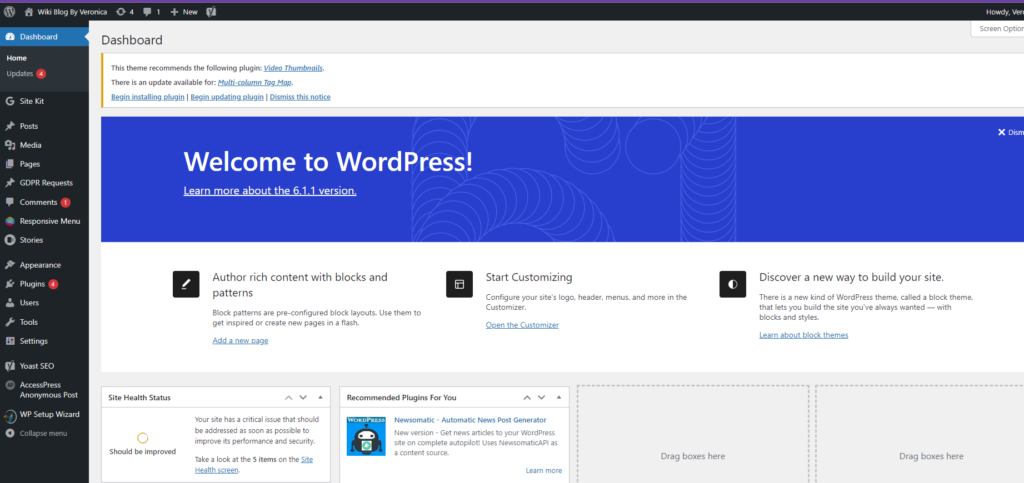When it comes to building a website, there are several options to choose from, ranging from website builders to content management systems (CMS) like WordPress. WordPress is a popular content management system (CMS) that powers over 40% of all websites on the internet. It is an open-source platform that allows users to create, manage, and publish content easily. However, like any other platform, WordPress also has its advantages and disadvantages. In this article, we will explore 10 pros and 10 cons of building your website with WordPress, along with real-life examples and statistics from 2022–2023.

Pros of building your website with WordPress:
Flexibility
WordPress is a highly flexible platform that can be used for a wide range of websites, from personal blogs to e-commerce stores. It offers a variety of themes and plugins that can be customized to suit your specific needs.
User-friendly
WordPress is easy to use, even for beginners. The platform has a user-friendly interface that allows users to create and publish content easily.
SEO-friendly
WordPress is optimized for search engines and has several built-in SEO features that can help improve your website’s ranking on search engines.

Mobile-responsive
WordPress is mobile-responsive, meaning that your website will look great on any device, whether it’s a desktop, laptop, tablet, or smartphone.
Large community
WordPress has a large and active community of users, developers, and designers who contribute to the platform by creating new themes and plugins, providing support, and sharing knowledge.
Cost-effective
WordPress is free to use and open-source, which means that you can save a lot of money on development costs.
Customizable
WordPress allows you to customize your website to your liking by adding your own branding, colors, fonts, and layouts.
Scalable
WordPress is highly scalable, meaning that you can add new features and functionality to your website as your business grows.
Security
WordPress is a secure platform that is regularly updated to ensure that it is protected against the latest security threats.
Integrations
WordPress can be integrated with a wide range of third-party tools and services, including social media, email marketing, analytics, and more.
Cons of building your website with WordPress:
Learning curve
While WordPress is user-friendly, it still has a learning curve, especially for beginners who are new to website development.
Maintenance
WordPress requires regular maintenance, including updates, backups, and security checks, which can be time-consuming and costly.

Speed
WordPress websites can be slow to load, especially if they are not optimized for speed.
Security vulnerabilities
While WordPress is secure, it is also a popular target for hackers, so you need to be proactive in protecting your website against security threats.
Plugin compatibility
Not all plugins are compatible with each other, which can cause conflicts and issues with your website.
Customization limitations
While WordPress is customizable, there are limits to what you can do without coding knowledge.
Theme limitations
While WordPress offers a wide range of themes, some of them may not be optimized for SEO or mobile responsiveness.
Plugin bloat
Installing too many plugins can slow down your website and cause other performance issues.
Support
While WordPress has a large community, it can be difficult to get support if you run into issues that require technical expertise.
Dependence on third-party developers
If you rely on third-party developers to customize or maintain your website, you may run into issues if they go out of business or stop supporting their products.
Real-life examples:
Let’s take a look at some real-life examples of websites built with WordPress:
The Walt Disney Company’s website is built with WordPress. It features a modern, responsive design and a user-friendly interface that allows users to browse the company’s products and services easily. The website also includes a blog section, which is updated regularly with news, updates, and announcements.

TechCrunch is a popular technology news website that is built on WordPress. The website features a clean, modern design and a responsive layout that works well on all devices. It also includes a variety of features, including a news section, event listings, and a directory of technology companies.

The New Yorker is a renowned magazine that covers a range of topics, including politics, culture, and current events. The website is built on WordPress and features a minimalist design that is easy to navigate. It also includes a variety of features, including a subscription system, a search function, and a blog section.

Sony Music’s website is built on WordPress and features a modern design that showcases the company’s latest music releases, artists, and tours. The website also includes a music player, a video player, and a store where users can purchase music and merchandise.

Here are some statistics related to WordPress usage and trends from 2022-2023:
WordPress powers over 40% of all websites on the internet, making it the most popular CMS in the world.
WordPress has a market share of over 60% in the CMS market.
WordPress themes have been downloaded over 1 billion times.
The most popular WordPress plugin, Yoast SEO, has been downloaded over 350 million times.
WordPress is available in over 200 languages.
The WordPress community has over 80,000 contributors and developers.
WordPress.org, the official website for the WordPress project, receives over 100 million unique visitors per month.
The average cost of building a WordPress website is around $2,500 to $10,000.
The most popular WordPress hosting providers include Bluehost, SiteGround, and WP Engine.
The most popular WordPress plugins in 2022-2023 include Yoast SEO, WooCommerce, Contact Form 7, Jetpack, and Elementor.
Conclusion:
In conclusion, WordPress is a highly flexible and user-friendly platform that can be used to build a wide range of websites. It offers several advantages, including cost-effectiveness, customizability, and scalability. However, it also has its disadvantages, including a learning curve, maintenance requirements, and security vulnerabilities. Ultimately, the decision to use WordPress for your website will depend on your specific needs, goals, and budget. We hope this article has provided you with the information you need to make an informed decision about using WordPress for your website in 2022-2023.







I have read your article carefully and I agree with you very much. So, do you allow me to do this? I want to share your article link to my website: Sign Up